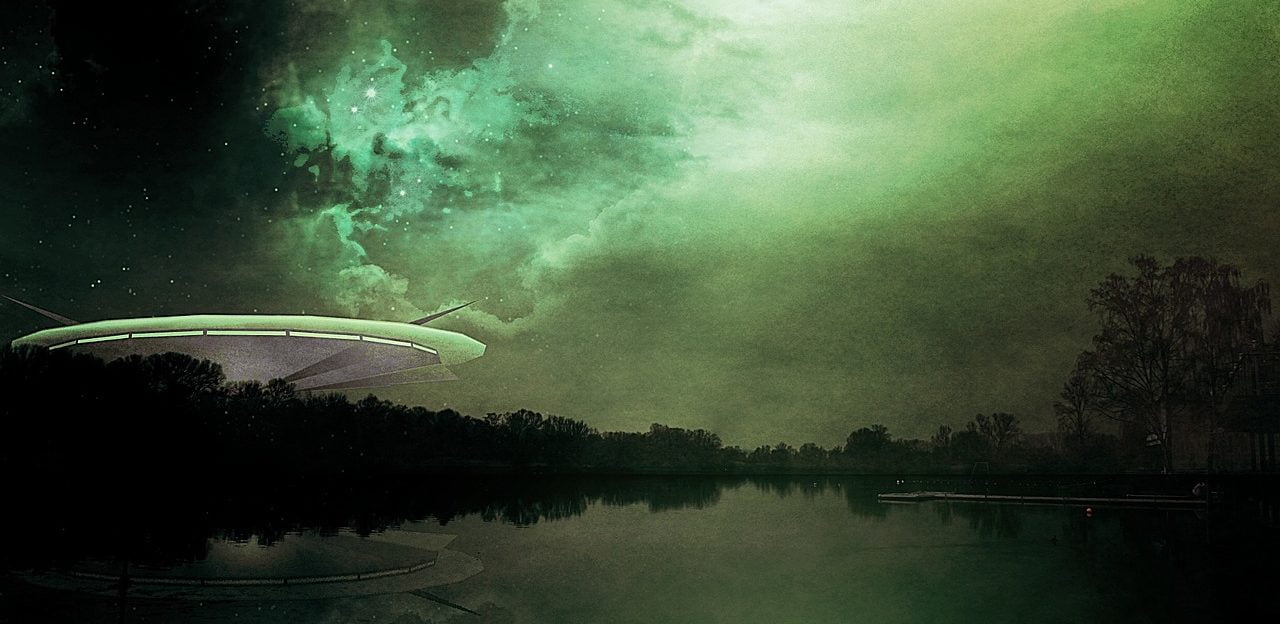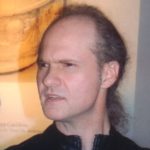The old man looked near death but protested he was fine. He liked it here.
He said the ruins of the unknown beings of Tencheros brought him peace for they reminded him nothing lasts forever. But there was more, I knew. His name was Tarrant; he remembered it well enough, and his home ports, but wanted no more of them.
I looked around in deepening twilight, from our scout parked on meadowland a half-click from the towers, to the silent edifices of civilization soaring into the gloom, and asked him again if he would not come with us. He waved me off with a smile, leaning on his staff, the breeze stirring the tattered remnants of robe and suit we dimly recognized as survival equipment from the lost exploration ship Coromandel.

“I’m fine, young Miss Caleva,” he grunted. “Thanks for stopping by, an’all, but there’s really no need. This is my home now, and here I’ll stay.” Something in the eyes said more, sharp and bright beneath the straggling brows of untreated age; a paradox, a 26th century human, unafraid to die a natural death. He waited, expression prompting, coaxing me to find the thread of meaning he dangled tantalizingly.
I ran my hands through short, dark hair, knew my skipper would be looking for a decision–we had to be away, back to the Leif Ericson in orbit, our survey done. “Tell me, old one–” I smiled, for I was sure he was but a fraction my age “–what keeps you here?”
He shoved off the stone block on which he sat and gestured into the city, along the banks of a stream that carved its way into the forest of towers. “Indulge me.” We set off, an easy amble, heard life beginning to chirp with the end of day, and I imagined this place when power had flowed and it gleamed with a million lights. “What more should I need?” he asked, a prompt.
“Companionship. Your fellow creatures. Medicine. The foods of old.”
“I don’t lack for company, this world hums with life. My fellow creatures are all around me, and they have more of interest to say in their silence than an army of babbling humans ever might. Medicine? I’m not sick. Food? Food abounds.” He gestured to strange growths between tumbled stones and girders. “Life overcomes, you see. It’s everywhere, and has made me welcome.”
The sky was deepening from royal blues toward rich purples, a great and glorious gloaming as stars began to shine. I found I understood his reluctance, for here was beauty at its rawest. Whoever saw such a sky on the colonies of old? “Is there none you would see again?”
“I had family, long ago. They’ll have moved on, found others. They don’t need me any more than I need them.”
“If you’re certain,” I said softly, my tone informing him it was time for me to turn back, place my feet upon the road across the stars.
“A moment,” he whispered, gesturing along the stream, where placid ponds reflected the dusk and reeds nodded in the breeze. Then I saw them–glimmers appearing on the stream like stars breaking surface. I watched entranced as they swirled in glittering patterns, then gasped as they left the water and rose slowly, like bubbles of living light; blues and greens, luminous yellows, rising at first by handfuls, then by the hundred, and more thousands than I would ever know.
My expression said more than I could find words for, and Tarrant squeezed my shoulder. “It is the way of this world. They live in the waterways. Not sure if they’re more like insects or worms, but they mastered flight without wings. I call them starshine. Or bioglow.” He raised a hand and bubbles drifted around it silently, carried gently on the breeze, bobbing back toward the stream before they could be carried away. Now Tarrant sank down by me. “It’s their life cycle, you see. This is their mating swarm. Their lifespan is just a day. A single day in which to do everything a life can or should hold, then ascend in this glory to find their ultimate purpose–bringing forth tomorrow’s generation.” He smiled gently, craggy face and straggling beard lit by the living light. “I’m here each evening to see it, and I stand immortal before them.”
“But you’re not,” I whispered, leaving implicit the fact I was, and he could be. But it was not what he wanted.
“All things in their time,” he whispered. “Look upon the irony here—the city builders are long gone, a failed society, but by the feet of their crumbling towers, life renews every day.” He smiled. “Tell me, where do you think permanence lies?” He sat back to watch the dance of the starshine, rising far above now in their ballet of life, and I knew I would win not another word from him.
My com called softly; time up. I squeezed his hand, made my way by the luminance, yet my heart was tugged. I must go, yet… Perhaps simply being here made the difference, for, all the way back, I felt the longing; as I strapped in and the pilot took us up into the rich evening, I felt the most profound separation, and wondered if this myriad life touched the soul, the mind or just the body. Was the old man addicted to this spectacle, did it caress his brain centers with some chemical balm which made life wonderful?
If so, it was a delicious way to make peace with one’s existence, and I looked back with the strangest regret as I returned to the sky.
This story previously appeared in Emerging Worlds, January 2020.
Edited by Marie Ginga
Mike Adamson holds a doctoral degree from Flinders University of South Australia. After early aspirations in art and writing, Adamson returned to study and secured qualifications in marine biology and archaeology. He has been a university educator since 2006, is a passionate photographer, master-level hobbyist and journalist for international magazines. For more about him, check out his website, The View From The Keyboard.

